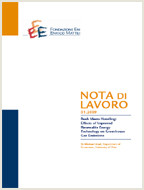Flexible Waste Management under Uncertainty

04.01.2013
Luca Di Corato, Natalia Montinari
C61, Q53
Real Options, Flexibility, Municipal Waste, Recycling
Climate Change and Sustainable Development
Carlo Carraro
In this paper, we use stochastic dynamic programming to model the choice of a municipality which has to design an optimal waste management program under uncertainty about the price of recyclables in the secondary market. The municipality can, by undertaking an irreversible investment, adopt a flexible program which integrates the existing landfill strategy with recycling, keeping the option to switch back to landfilling, if profitable. We determine the optimal share of waste to be recycled and the optimal timing for the investment in such a flexible program. We find that adopting a flexible program rather than a non-flexible one, the municipality: i) invests in recycling capacity under circumstances where it would not do so otherwise; ii) invests earlier, and iii) benefits from a higher expected net present value.
